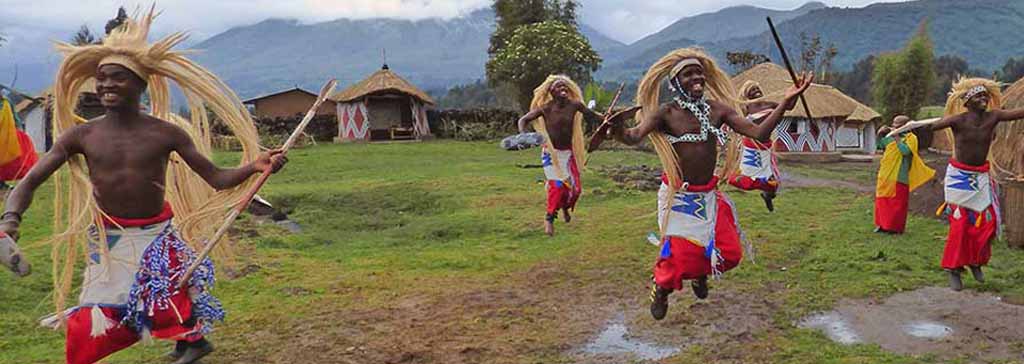Rwanda Wildlife, Culture and Heritage
This 10 days Rwanda tour starts and ends from Kigali. You will visit Butare, Rwanda’s second largest city with a number of attractions including the National Museum, botanical gardens & Rugarama hot-springs. You will go to Nyungwe forest – one of the most beautiful & pristine mountains rain-forests for a guided chimpanzee walk. After the chimp tracking experience, you will visit Kibuye and relax at the fabulous Lake Kivu. Possibly you will also take a boat cruise or Swim in the water. A speed boat to Gisenyi will get you to see some of the fishing villages and you can also cross the border to Goma (DRC). You will also have a chance to visit some of the orphanages founded after the 1994 genocide.
This trip also takes you to the Virunga Volcanoes where you get to enjoy an amazing gorilla trekking experience. This is one of the best highlights for most trips to Rwanda.
From here you will end the tour with a city tour of Kigali, visiting some of the most popular places including the local markets, genocide memorials and other interesting places.
-
Destination
-
DepartureKigali airport / Kigali airport
-
Departure TimePlease arrive by 9:15 AM for a prompt departure at 9:30 AM.
-
Return TimeApproximately 5:30 PM.
-
Dress CodeCasual, comfortable athletic clothing, hiking shoes, hat and light jacket.
-
IncludedRwanda Wildlife, Culture and HeritageEntry FeesPersonal GuideBreakfast
-
Not IncludedDeparture Taxes5 Star Accommodation
Day 1: Arrive in Rwanda
Day 2: Kigali – Butare.
Day 3: Butare Cultural visits
Day 3: Nyungwe forest national park
Day 5: Nyungwe Forest to Kibuye
Day 6: Kibuye – Gisenyi
Day 7: Gisenyi – Kinigi
Day 8: Gorilla Trekking
Day 9: Second gorilla trekking or another activity – Transfer to Kigali
Day 10: Kigali visit and departure
End of tour
TOUR LOCATION
This trip also takes you to the Virunga Volcanoes where you get to enjoy an amazing gorilla trekking experience. This is one of the best highlights for most trips to Rwanda.
History of the City
Culture
Despite the country’s turbulent political past, Rwanda boasts a rich and diverse culture which spans centuries. Very few external influences have managed to infiltrate the culture, which is admirable considering the prolonged period of Belgian rule to which the country was subjected. Rwandan music is an integral part of both daily life and traditional ceremonies, with different regional groups contributing different sounds, instruments and dances to the national culture. Intore is one of the most famous musical performances which consists of ballet-style dancing, more traditional African dancing and a highly impressive drumming routine. As with most East African cultures, clothing in Rwanda is a representation of culture, family and in more rural communities, ranking. Female dresses worn in traditional communities are called mushanana, which are generally made from wonderfully ornate, hand-woven materials. Rwanda also has a proud tradition of crafting which can be seen in most of the handicrafts sold at local markets. Many items are painstakingly made by hand, including grass items like baskets and mats, and wooden items like bowls and masks. While the handicrafts are great for souvenirs and decorations, they are made traditionally to perform important functions in the home.Comments:
WRITE A REVIEW
ADDITIONAL INFO
INCLUDED
- Transport in a 4WD vehicle with pop-up roof.
- All fuel for the tour
- English speaking Ugandan driver/guide.
- Accommodation and Meals on Full Board (Breakfast Lunch and Dinner)
- Park-entrance fees for all National parks
- All activities described in the itinerary
- 1 Chimp permit per person
- 1 Gorilla permit per person.
- Drinking water throughout the safari.
- International air fares
- Entry visa Uganda
- Meals that are not part of your accommodation.
- A porter for during the gorilla tracking’s (someone who carries your daypack).
- Personal (medical/travel) insurance
- Tips and gratuities to rangers, driver/guide, porter, hotel staff, etc.
- All expenses of personal nature (e.g. drinks, laundry, optional activities, souvenirs etc.)














TASHA STEWART
My fiance and I had never been to rwanda, but wanted to plan a unique elopement trip to this place. We had no idea where to start, and turned to some internet research to find the services of this agency and eventually connect with the team at this travel agency. From the first email exchange, we knew that our travel consultant and her team would be our travel company.Thanks a lot Moses.
JUDITH BROWN
I cannot speak highly enough about our 3 week trip to this place and the services provided by this travel company. Everything was seamless. The private guides were interesting and knowledgable. We felt that they were more than just guides. It was like we had a friend in each city.